Australia So Much to See




Chamelaucium ciliatum, Stirling Waxflower, Albany Waxflower.
Low growing shrub with five petalled flowers in shades
of white and pink.
Seen in August near Narembeen (above), Wheatbelt region, Western Australia.
The white flowering
form (at right) seen at Albany in the Great Southern Region was flowering in Autumn. This species can flower at any time of the year
and can be found along the coast from Albany to the Esperance area, as well as through the Great Southern, Wheatbelt and parts of
the Goldfields regions.








Chorizema dicksonii, Yellow-eyed Flame Pea
A bright red or orange pea flower with a yellow ‘eye’ in the centre, peaking a little on
each half of the sail. Darker red sails cover the keel. Calyx and flower stem are hairy. Foliage is elongated leaves
terminating in a spine, recurving backwards.
October
Boyup Brook, South West region, Western Australia, and occurs through the
Wheatbelt and South West regions from Mogumber (Victoria Plains Shire) to Boyup Brook shire.


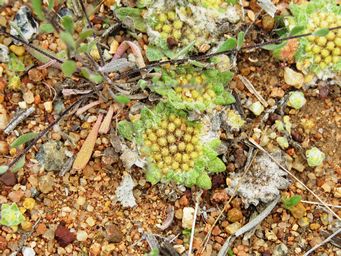
Chthonocephalus pseudevax, Woolly Groundheads
A tiny low growing plant with silk coated leaves elongated to a point that cup a cluster
of tiny yellow flowers each being one to two millimetres across, with seed capsules developing as seen here with the appearance
of spiky balls.
Seen in flat depressions and saline areas in the Yalgoo and Morawa areas. Grows through the Gascoyne, Mid West, Wheatbelt and Great Southern and Goldfields regions.
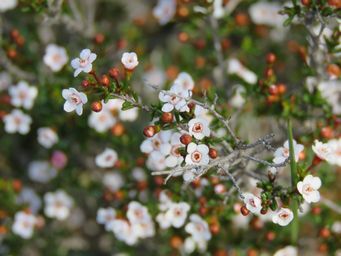
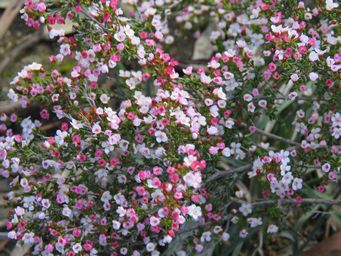
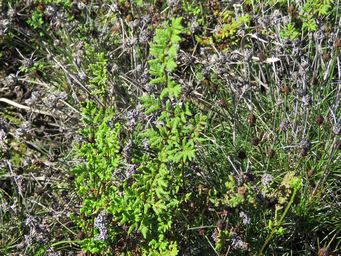
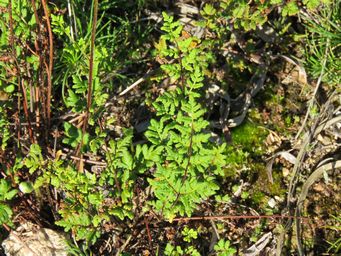
Cheilanthes austrotenuifolia, Rock Fern, Green Rock Fern.
A small native fern
August
Merredin, Wheatbelt region, Western Australia,
in damp areas on and around granite outcrops. Found through the Mid West, Wheatbelt, South West, Great Southern, and Goldfields
regions, as well as in some locations in the Pilbara. Also occurs in most states of Australia, particularly in the southern
areas.
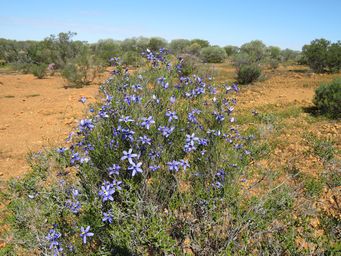
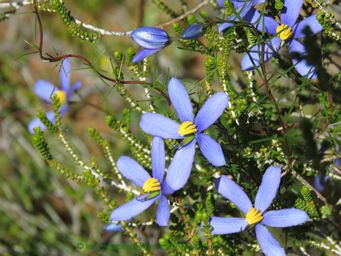
Cheiranthera simplicifolia (2007) formerly Cheiranthera filifolia var. simplicifolia. Hand flowers, Finger Flowers, Blue Finger Flowers,
names which are used for all Cheiranthera species.
Lovely large purple flowers with bright yellow anthers to one side, slightly curled,
like the fingers of a hand. Fine foliage. Twining, which sets it apart from the similar Cheiranthera filifolia. This
one was twining through and above another shrub.
August
Yalgoo, and found in parts of the Mid West.
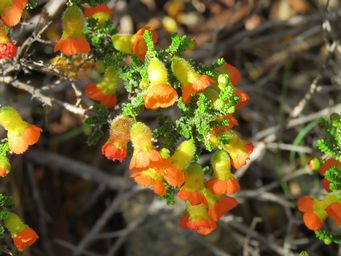
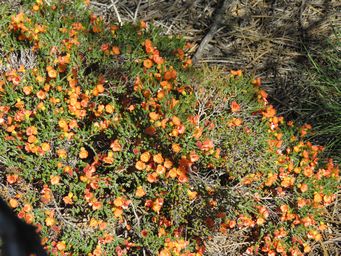
Cheyniana microphylla 2009 (formerly Balaustion microphyllum), known as Bush Pomegranate due to the colour and shape of the flowers.
A prostrate plant with bell shaped red flowers that have a hair covered long rear of flower, green when first flowering but reddens
with age. Foliage is very short and leaves opposite with alternating pairs a right-angles.
Pindar (site where seen is
outside of the Greater Geraldton City Council and in the Murchison Shire), Mid West region, Western Australia. Found in the
Mid West region.